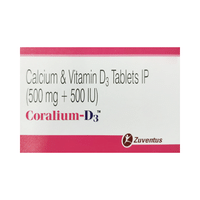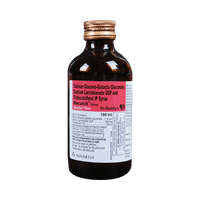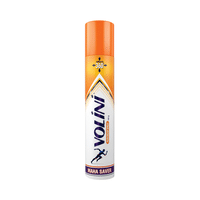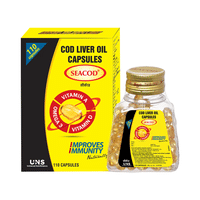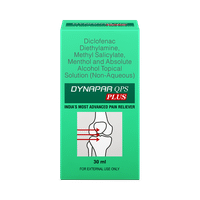Lip D 5mg/1000IU Tablet

Rs.93.10for 1 strip(s) (10 tablets each)
food interaction for Lip D
alcohol interaction for Lip D
pregnancy interaction for Lip D
lactation interaction for Lip D
food
alcohol
pregnancy
lactation
Lip D 5mg/1000IU Tablet is to be taken with food.
None
None
CAUTION
It is unsafe to consume alcohol with Lip D 5mg/1000IU Tablet.
UNSAFE
Lip D 5mg/1000IU Tablet is highly unsafe to use during pregnancy. Seek your doctor's advice as studies on pregnant women and animals have shown significant harmful effects to the developing baby.
UNSAFE
Lip D 5mg/1000IU Tablet is probably unsafe to use during breastfeeding. Limited human data suggests that the drug may pass into the breastmilk and harm the baby.
CONSULT YOUR DOCTOR
SALT INFORMATION FOR Lip D
Rosuvastatin(5mg)
Uses
Rosuvastatin is used in the treatment of high cholesterol and prevention of heart attack and stroke.
How it works
Rosuvastatin is a lipid-lowering medication (statin). It works by blocking an enzyme (HMG-CoA-reductase) that is required by the body to make cholesterol, thereby lowering "bad" cholesterol (LDL) and triglycerides and raising "good" cholesterol (HDL).
Common side effects
Muscle pain, Weakness, Headache, Abdominal pain, Dizziness, Joint pain, Nausea, Rash, Itching, Protein in urine, Anaphylactic reaction, Low blood platelets, Muscle damage, Rhabdomyolysis, Increased transaminase level in blood, Blood in urine, Jaundice, Systemic lupus erythematosus
Vitamin D3(1000IU)
Uses
Vitamin D3 is used in the treatment of Vitamin D deficiency and osteoporosis.
How it works
Vitamin D3 is a form of vitamin D. It raises vitamin D levels in your blood. This in turn raises calcium levels in your blood by helping you absorb more calcium from food.
Common side effects
Increased calcium in urine, Loss of appetite, Increased calcium level in blood, Itching, Rash, Urticaria, Facial swelling, Genital edema, Dry skin, Nail disorder, Erythematous rash, Decreased prothrombin level in blood, Difficulty in swallowing, Weakness, Fatigue, Sleepiness, Headache, Dryness in mouth, Metallic taste, Nausea, Vomiting
SUBSTITUTES FOR Lip D
6 Substitutes
6 Substitutes
Sorted By
 Rs. 206.60pay 117% more per Tablet
Rs. 206.60pay 117% more per Tablet Rs. 124save 14% more per Tablet
Rs. 124save 14% more per Tablet Rs. 99.50pay 4% more per Tablet
Rs. 99.50pay 4% more per Tablet Rs. 93.50save 3% more per Tablet
Rs. 93.50save 3% more per Tablet Rs. 52.70save 45% more per Tablet
Rs. 52.70save 45% more per Tablet
Expert advice FOR Lip D
- Rosuvastatin treats high cholesterol by lowering "bad" cholesterol (LDL) and triglycerides (fats). It should be taken in addition to regular exercise and low-fat diet.
- In general, Rosuvastatin is safe. It may cause diarrhea, gas or an upset stomach. If any of these happen to you, take it with food.
- Inform your doctor if you experience fatigue, muscle weakness or muscle pain.
- Your doctor may check your liver function before starting the treatment and regularly thereafter. Inform your doctor if you notice signs of liver problems such as stomach pains, unusually dark urine or yellowing of skin or eyes.
- Inform your doctor if you have kidney disease, liver disease or diabetes before starting treatment with this medicine. If you are diabetic, monitor your blood sugar level regularly as Rosuvastatin may cause an increase in your blood sugar level.
- Do not take Rosuvastatin if you are pregnant, planning a pregnancy or breastfeeding.
Frequently asked questions FOR Lip D
Rosuvastatin
Q. For how long should I take Rosuvastatin?
You may need to take Rosuvastatin for life or for as long as directed by your doctor. The cholesterol levels will be maintained only till you are taking Rosuvastatin. Stopping Rosuvastatin without starting a different treatment may increase your cholesterol levels again. This medicine has only a few side effects and is usually considered safe if taken as directed by the doctor.
Q. Does Rosuvastatin cause weight gain?
No, there is no evidence of Rosuvastatin causing weight gain. If you are taking Rosuvastatin and gaining weight, consult your doctor. The doctor may get some investigations done to know the reason for the weight gain.
Q. Does Rosuvastatin make you tired?
Yes, Rosuvastatin can make you feel tired. This is because it reduces the energy supply to the muscles in the body. However, the exact reason behind the phenomenon is unknown and needs more research. Tiredness usually occurs after exertion. Generalized fatigue is more often in people with heart disease or those suffering from liver illness. Rosuvastatin also causes muscle damage which further worsens the tiredness. Therefore, you must consult your doctor if you feel tired while taking Rosuvastatin.
Vitamin D3
Q. Is it better to take Vitamin D3 at night or in the morning?
You can take Vitamin D3 at any time of the day, morning, or night. However, there is limited information available about the best time to take Vitamin D3. Take it exactly as advised by your doctor.
Q. What are the benefits of taking Vitamin D3?
Vitamin D3 is important for maintaining bone health, support the health of the immune system, brain, and nervous system. It also regulates insulin levels and is also important for a healthy heart and blood vessels.
Q. How should Vitamin D3 be taken?
Vitamin D3 should be swallowed whole with water and should not be crushed or chewed. It is advised to take it with the main meal of the day to increase its absorption.















